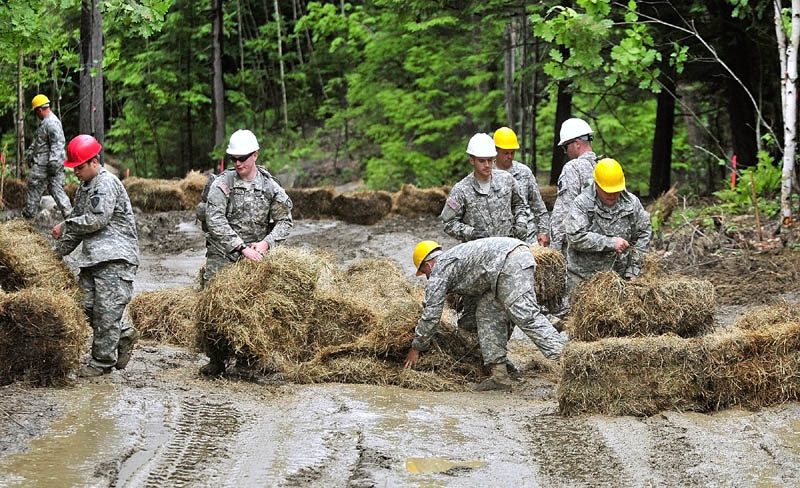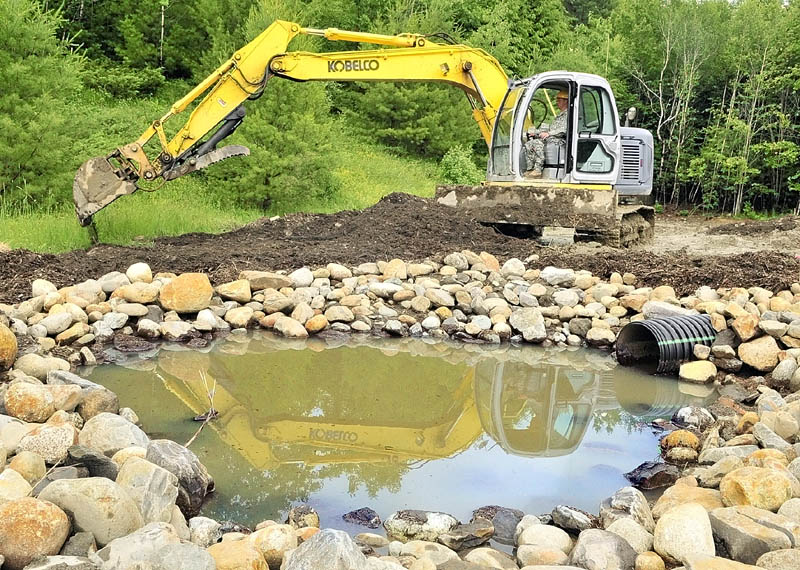AUGUSTA — Soldiers clad in camouflage and hard hats forged a partial road through the woods of Augusta over the last two weeks.
They helped open up access not for tanks and troop trucks, but for carloads of skiers, hikers and bikers.
While the work the 34 Maine Army National Guard citizen soldiers did in a joint project with the city of Augusta and nonprofit group Augusta Trails was not a combat operation, it was very much like what the engineering and construction outfit could be called to do at war.
“It’s an invaluable training opportunity, to create a road in a wooded, hilly area like this,” said Lt. Jonathan Bratten, of Portland, officer in charge of the project. “We’re a heavy construction company. We’re supposed to be able to build any road, anywhere. Building roads, airfields, opening lines of communication.
“We’re a construction company that, at any minute, could be called off to war.”
Soldiers from the Westbrook-based 262nd Engineering Company, 2nd Platoon, who are part of the Gardiner-based 133rd Engineering Battalion, laid the groundwork for about a half-mile of new road in the Bond Brook Recreation Area, getting about halfway to a connection the city and Augusta Trails plan to provide access to the trail system from Bond Brook Road.
The partially built road will be finished by private contractors hired by Augusta Trails, and provide better access to a large open “bowl” area that organizers said is a great spot for spectators at ski races and other events, and may one day be the site of a lodge.
Jim Goulet, director of parks, cemeteries and trees for the city, said they hope to have the road completed by fall, in time for the Nordic skiing season.
“It’s part of the original plan to provide better access to users,” said Mike Seitzinger, an Augusta attorney and president of Augusta Trails.
“It’s really key, both for everyday users — hikers, walkers, runners, skiers, birdwatchers — and for events we’ll hold there. We’re so appreciative of the National Guard and the work they did for us, under some difficult circumstances.”
One of the soldiers’ most difficult combatants in the woods of Augusta was the weather, which included heavy rain. Their worksite became a muddy mess.
“If we had one more day of dry conditions, this road would look 10 times better,” Goulet said. “It just got too wet for road-building. But these young soldiers have been great, hardworkers.”
The soldiers did the work on the city-owned land between Bond Brook and the Augusta State Airport as part of their annual two-week Guard training.
When not training with Guard, the soldiers are construction workers, pizza delivery drivers, office workers, financial managers and engineers, among other regular jobs.
Bratten, a security officer for Mercy Hospital when not training with the Guard, said many of the company’s soldiers are young and had little or no experience with the heavy equipment they used to build the road, and could be called upon to use if called to duty in the field.
Bratten said the company’s more experienced members, such as Staff Sgt. Kenneth Merrifield, of Wells, help with the training.
Merrifield works at Camp Keyes and has been in the Guard for some 20 years, including deployments to Iraq and to New Orleans after Hurricane Katrina. He’ll train the newcomers on how to use the company’s heavy equipment, including graders, frontloaders, dump trucks, rollers, and excavators.
Bratten estimated 80 percent of the soldiers, during the two-week project, were able to train on and use a piece of heavy equipment they had never used before.
Bratten said if the work were only done by experienced skilled hands such as Merrifield, the road likely could have been completed already. But he said the Guard’s goal in such projects is twofold: to give back to the community by providing valuable work, while also giving the soldiers important training.
Despite that, Seitzinger said, the work appears to have been well done.
Augusta Trails is in the midst of a fundraising campaign to pay for improvements to the recreation area. Seitzinger said they’ve raised about $350,000 toward their goal of $480,000.
Other than the partially completed road, the soldiers left something else in the Augusta woods to show they were there.
One of the company members hand-carved the outline of a castle into a roadside boulder. It’s a symbol of the U.S. Army Corps of Engineers, as well as their company name, and “Horsemen,” the company’s nickname.
Keith Edwards — 621-5647
kedwards@centralmaine.com
Send questions/comments to the editors.




